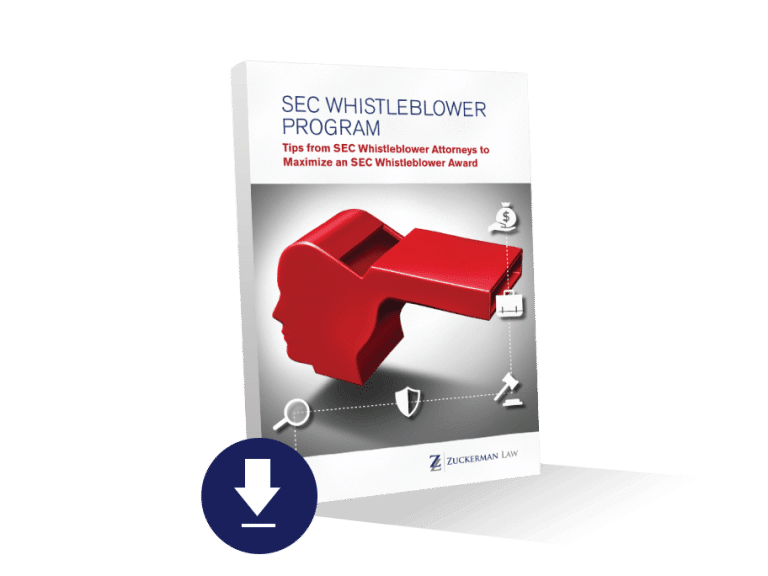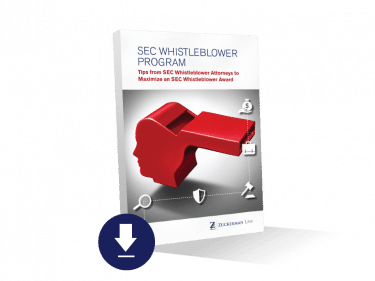
Rules Governing the SEC Whistleblower Reward Program
The rules governing the SEC Whistleblower Program are voluminous and somewhat complex. But to maximize the chance of the SEC acting on a whistleblower tip and qualifying for a SEC whistleblower award, it is important to master these rules. More than 22,000 whistleblower have submitted information to the SEC Whistleblower Office using Form TCR.
In 2011, one of our attorneys helped shape the rules implementing the Dodd-Frank whistleblower provisions, and led a coalition of whistleblower rights organizations in meetings with the SEC Chair, SEC Commissioners and senior enforcement staff. We have achieved success for SEC whistleblowers by utilizing the SEC whistleblower rules to maximize future potential awards, and routinely counsel whistleblowers worldwide about whistleblower rewards and protections.
To date, the SEC has received approximately 22,000 whistleblower tips, but fewer than 60 whistleblowers received awards. It is imperative that whistleblowers prepare high-quality submissions that persuade the SEC to devote limited resources to investigating the whistleblower’s disclosure.
Guide to SEC Whistleblower Rules
We work with whistleblowers worldwide to leverage the SEC whistleblower rules to maximize an award. Download our free guide to the SEC whistleblower rules SEC Whistleblower Program: Tips from SEC Whistleblower Attorneys to Maximize an SEC Whistleblower Award:
SEC Whistleblower Rules: Know Your Rights and Protections
SEC whistleblowers have important rights and protections, including protections against retaliation under both the Dodd-Frank Act and the Sarbanes-Oxley Act. Download our free guide to Sarbanes-Oxley Whistleblower Protection: Robust Protection for Corporate Whistleblowers
Why Should You Retain an Experienced SEC Whistleblower Lawyer Familiar with the SEC Whistleblower Rules?
The SEC Whistleblower Program permits anonymous submissions when the whistleblower is represented by counsel. Click here to learn the answers to these questions about anonymous whistleblower tips:
- Can I still receive an award if I submit a tip anonymously?
- How will my attorney submit an anonymous tip on my behalf?
- How could an anonymous tip potentially expose me as the whistleblower?
- Are there any disadvantages to anonymous whistleblowing?
- Will the SEC ever know my identity if I submit a tip anonymously?
In addition to helping protect the identify of a whistleblower, an experienced whistleblower lawyer can increase the chances that the SEC will act on a tip and can advocate on behalf of the whistleblower to try to obtain the maximum award percentage. A whistleblower attorney can also represent the whistleblower in all interactions with the SEC and provide advice on mitigating the risks entailed in whistleblowing.
In addition to preparing a whistleblower submission on Form TCR, an SEC whistleblower attorney can determine the appropriate evidence to provide (or not provide) to the SEC as well as advise the whistleblower on any potential exposure as a result of providing the evidence. Finally, and as a practical matter, the SEC will likely view a whistleblower’s tip as more credible if it is submitted by a reputable SEC whistleblower attorney who has prior experience working with the SEC Whistleblower Office.
Click here to learn more about the benefits of experienced whistleblower representation.
Impact of SEC Whistleblower Rules in Recent Whistleblower Award Determination
A recent November 2017 order determining whistleblower award claims highlights the importance of adhering to and leveraging the SEC whistleblower rules to increase the likelihood of obtaining a SEC whistleblower award. In that order, two claimants each received an award of approximately $8M, and five claimants were denied any award.
- The successful whistleblowers provided original information and provided such information voluntarily, i.e., “prior to receiving a request, inquiry, or demand from the Commission.”
- One of the successful whistleblowers provided significant information that became the focus of the investigation and subsequent enforcement action. And the whistleblower continued to assist the staff performing the investigation, including the identification of potentially relevant documents and witnesses.
- Two of the claimants that were denied awards failed to provide original information, i.e., the information that they provided was already known to the SEC.
- Two claimants failed to show that their submission significantly contributed to the success of an enforcement action. In other words, they were unable to demonstrate that something unique about their submission made an additional significant contribution to the success of a covered action. In particular, they provided information that was largely duplicative of other information that staff had already received or had learned during the course of its investigation.
SEC Whistleblower Rules Governing SEC Whistleblower Process
How to Qualify for a SEC Whistleblower Award Under the SEC Whistleblower Rules
SEC Whistleblower Lawyers
Resources About SEC Whistleblower Rules
- Forbes: One Billion Reasons Why The SEC Whistleblower-Reward Program Is Effective
- SEC Whistleblower Program: Tips from SEC Whistleblower Attorneys to Maximize an SEC Whistleblower Award
- Auditors’ and accountants’ guide to SEC whistleblower awards
- Whistleblower Protections and Incentives for Auditors and Accountants
- How to Report EB-5 Fraud and Earn an SEC Whistleblower Award
- SEC Cracking Down on Ponzi Schemes
- Guide to Sarbanes Oxley Whistleblower Protection
- SEC Scrutinizes “Fake News” Stock Promotion Schemes
- SEC Whistleblower Program: Exposing Insider Trading
- SEC Awards for Disclosures of Foreign Bribery or FCPA Violations
- Whistleblower Rewards and Bounties for Disclosures of Market Manipulation Schemes
- SEC Targeting Investment Adviser Fraud
- Compliance Personnel, Auditors, Officers and Directors Can Obtain SEC Whistleblower Awards
- Money Laundering and the SEC Whistleblower Program
- International Whistleblower Representation – SEC Whistleblower Attorney
- Anonymous Whistleblowing: Does the SEC Whistleblower Program Protect a Whistleblower’s Identity?
- SEC Awards for Disclosures of Foreign Bribery or FCPA Violations
- Securities Fraud Enforcement Action Prompts the Question: What Was the Company Smoking?
- Compliance Officer Whistleblower Representation
- SEC Whistleblower Program: What is the SEC Form TCR?
- Tale of Two Whistleblowers: Lessons Learned from Today’s SEC Whistleblower Award
- Report Underscores Importance of Whistleblower Rewards and Protections for Internal Auditors
- SEC Sanctions: Whistleblower Reference Guide
- Protections and Rewards for Cybersecurity Whistleblowers
- EB-5 Visa Scandal Underscores the Critical Role Whistleblowers Play in Exposing EB-5 Fraud
- SEC Enforcement Director Touts Success of SEC Whistleblower Program
- SEC Whistleblower Program Not Limited to Corporate Insiders
- SEC Pays $3M Award to Whistleblower
- SEC Draft Strategic Plan Affirms the Importance of the SEC’s Whistleblower Reward Program
- Leading SEC Whistleblower Law Firm Featured in Article About Growing Wave of Whistleblower Lawsuits
- Whistleblower Lawyer Interviewed About SEC Whistleblower Award
- Wall Street Journal Quotes Jason Zuckerman on Dodd-Frank SEC Regulations
- SEC Whistleblower Lawyer Quoted in National Law Journal About SEC Whistleblower Program
- SEC Whistleblower Lawyer Zuckerman Quoted About SEC Whistleblower Award for Independent Analysis
- SEC Whistleblower Lawyer Jason Zuckerman Quoted About Tips for SEC Whistleblowers
- Whistleblower Lawyer Jason Zuckerman Quoted About SEC Whistleblower Award
- Whistleblower Lawyer Interviewed About the Rise of Cybersecurity Whistleblowing
- Whistleblower Attorney Zuckerman Quoted in Washington Post About SEC Order
- Whistleblower Attorney Dallas Hammer Interviewed by Bloomberg About Dodd-Frank Protected Whistleblowing
- SEC Whistleblower Lawyer Zuckerman Quoted About SEC Whistleblower Award for Independent Analysis
- Audit committees need to dig into personal relationships
- Whistleblower Bounties Pose Challenges
- CFO Magazine Quotes Whistleblower Attorney Jason Zuckerman About Dodd-Frank Whistleblower Rules
- Fiscal Times Quotes Jason Zuckerman About Dodd-Frank Act Whistleblower Reward Provisions













